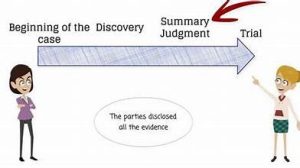Introduction
In litigation, timing is of the essence and is a critical aspect that could significantly have an effect on the case’s outcome. Summary judgment being a legal mechanism that permits courts to determine the case’s fate before proceeding for trial, has strict timelines. The timing of when a party selects to file a motion for summary judgment could either be a plus or be fatal to the case.

Timing is a key aspect in summary judgment
Understanding Summary Judgment
The summary judgment procedure provides for a swift and efficient means of resolving a case where there are no genuine disputes over material facts and the law is clear. It permits court to render a judgment in favor of one party without necessarily going for a full trial, saving time and resources for both the court and the parties involved.
The Key Aspects of Timing
- Early motion for summary judgment. In some instance, parties could opt to file for a motion for summary judgment at an early stage of the litigation process. This is often after the initial pleadings. The preceding strategy could be advantageous if the movant believes that the opposing party’s case is flawed fundamentally or has no merit. An early motion could lead to a faster resolution hence sparing both parties the long litigation process.
- After the discovery process. Most summary judgment motions are filed after the completion of the discovery process. Discovery allows the parties to gather evidence, take depositions and obtain the relevant documents. Filing a motion for summary judgment after the discovery process ensures that the movant has a comprehensive set of facts to support their arguments. It could also expose the weaknesses in the opponent’s case that were not apparent in the early stages.
- The complexity of the matter. The complexity of the legal issues and the volume of the evidence involved could have a significant impact on the timing of the summary judgment motion. In complex cases, parties could require more time for discovery and preparation before being confident enough to file a summary judgment. Moreover, filing prematurely in a complex matter could lead in the court denying the motion.
- Deadlines and local rules. The timing of a motion for summary judgment could be influenced by the deadlines and rules established by the jurisdiction or court in which the case is heard. Courts could specify when such motions could be filed and the deadlines of the responses. Resultantly, parties should adhere to the deadlines to avoid their motions being declared as untimely.

The timing of the summary judgment should be adhered to by the parties
The Importance of Timing
- Preservation of resources. Timing is key in summary judgment proceedings since it aids in the conservation of resources. Filing a summary judgment motion in a timely manner spares the parties expenses related to protracted trials, for instance, court fees, expert witness fees and attorney fees.
- Strategic advantage. Timing could provide a strategic advantage. Hence the parties ought to weigh the strengths and weaknesses of their case, the strength of their evidence, and the discovery status. Filing too early or too late could be detrimental. Further, a well-timed motion could catch the opposing party off guard granting them limited time to respond.
Good timing affords parties to a summary judgment strategic advantage
- Avoiding unnecessary litigation. A carefully timed summary judgment motion could prompt the opposing party to evaluate the case merits. If they realize that their case has no solid evidence or legal support, they could opt for voluntary dismissal or settlement. This is to avoid further litigation.
- Timing is also judicially efficient. Courts appreciate parties that respect the procedural rules and do not unduly prolong cases.
Conclusion
In the litigation world, timing is a critical issue. Parties should consider the strengths and weaknesses of their case, the discovery state, and the jurisdiction’s deadlines and rules when determining the ideal timing for a motion for summary judgment. A motion that is well-timed could result in a faster and more efficient resolution thus benefitting both parties that are involved and the entire court system.
